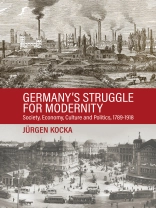In the historiography of modern Germany, the nineteenth century’s innovations mark a period of seismic change. From accelerating demographic growth to growing secularization and the rise of nationalism, it was a century which laid the foundations for both a civil society and the dictatorships of the twentieth century. In this comprehensive history of Germany from 1780 to 1918, Jürgen Kocka re-examines the transformative interactions that took place between society, economy, culture, and politics. Innovatively resituating these developments within a wider context of conflict and transformation in Europe, this book illuminates new ways to understand the emergence of classical modernity within the nineteenth century.
Зміст
List of Tables
Foreword to the English Edition
Preface to the English Edition
List of Abbreviations
Timeline
Chapter 1. Images of Nineteenth-Century Germany and Their Change Over Time
Chapter 2. The Century of Industrialization
Chapter 3. Population Growth and Patterns of Migration—Poverty and Gradual Amelioration
Chapter 4. An Increasingly Bourgeois Century
Chapter 5. Education and Scholarship, the Sciences and the Arts
Chapter 6. Nation State, Integration and War
Conclusion: The Breakthrough of Classical Modernity
Bibliography
Index
Про автора
Volker Berghahn is the Seth Low Emeritus Professor of History at Columbia University. He has written on European-American business and cultural relations for many years and more recently returned to the study of modern German history in the twentieth century. His recent publications include: Journalists between Hitler and Adenauer (2018), Hans-Günther Sohl als Stahlunternehmer und Präsident des Bundesverbandes der Deutschen Industrie (2020) and The Insider-Outsider of Early-Twentieth Century German Industry (2024).












